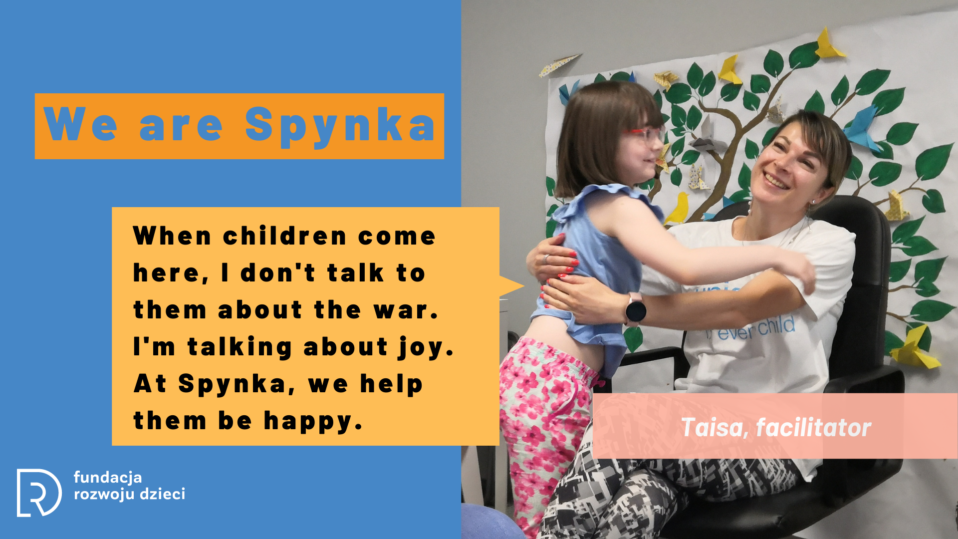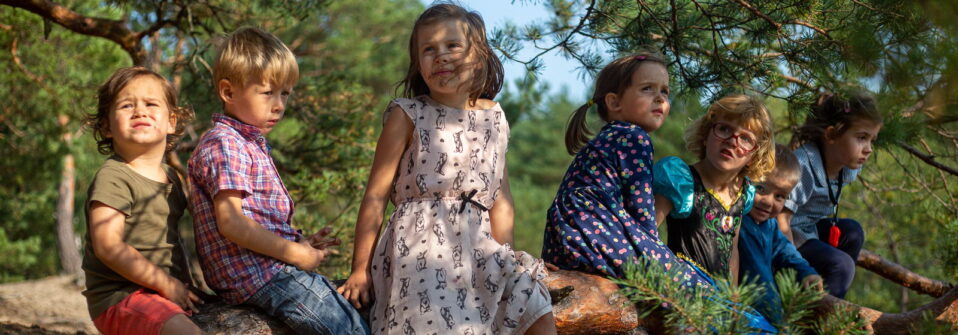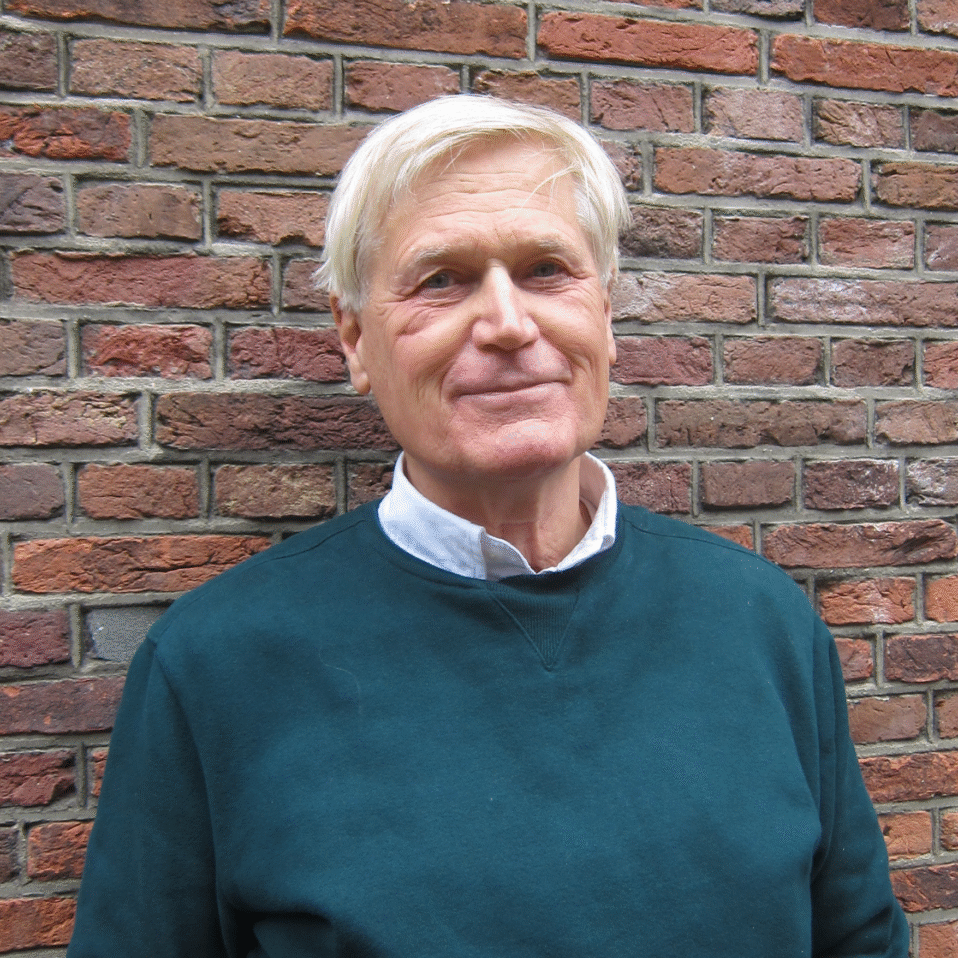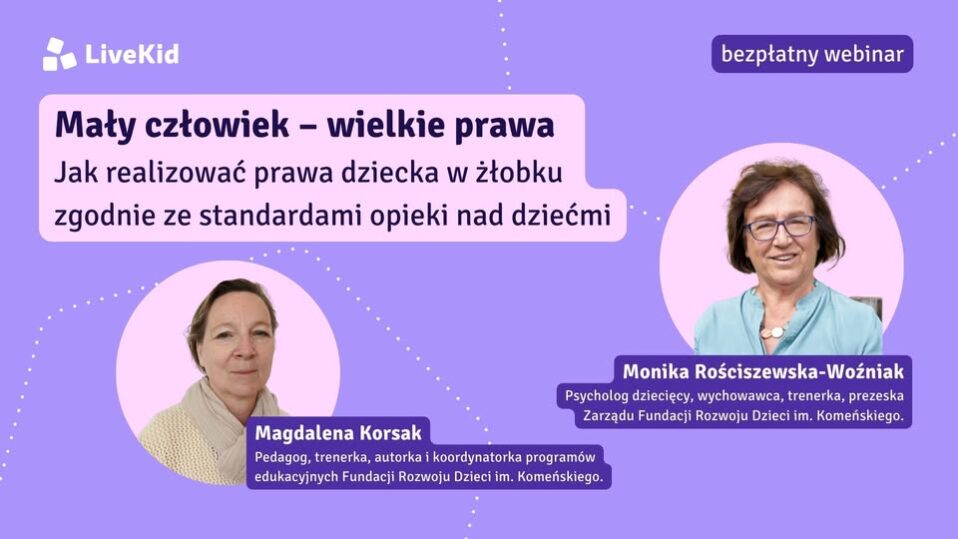Spynka* is about people. Every day their creativity, energy and commitment create a safe space open to every child. This space is woven from stories told in conversations, on paper through drawings and poems. “We are Spynka” gives the voice to adults and children, so that they can tell in their own words about how they got to Spynka and what Spynka has meant to them. This is Taisa’s story.
* “SPYNKA – 100 childcare centers in 100 days” is Fundacja Rozwoju Dzieci’s program for nursery and preschool age Ukrainian children in Poland. The developed childcare model addresses the special emotional needs of refugee families.
Polina: Hi! I’m Polina. What’s your name?
Taisa: My name is Taisa.
Polina: Hi Taisa! Could you tell me where are you from?
Taisa: I come from Zaporoże.
Polina: Oh, I know the situation there is really tough at the moment. Tell me, where do you live right now?
Taisa: Now I live in a room with my mother and son in Warsaw.
Polina: I also live in Warsaw. Just like you – in a room with my daughter. We have something in common. Please tell me what were you doing before the war?
Taisa: Before that, I was making handmade cosmetics for women. I have been making them at home.
Polina: Very nice. It is important to take care of yourself! Thank you. And when did you come to Poland?
Taisa: I came to Poland a week after the war started. On March 6, I crossed the border and arrived to Warsaw.
Polina: We crossed the border on March 4. We were waiting at home for a week. The road took us 3 days. It was a difficult time. My life has changed a lot since crossing the border. Tell me how your everyday life has changed?
What has changed? I was living separately with my child. My son had his own room, his own bed. We had our own house. Now I sleep in the same bed with my mother and son. We don’t have our own space.
Taisa: Everything is different for me. In Ukraine I had not used public transportation for 15 years. My child has never used public transportation in his life. We had our own car, our own life, our own apartment, our own house, our own job, our own savings. Everything has changed. I am learning to live in a new city and how to navigate by public transportation. What has changed? I was living separately with my child. My son had his own room, his own bed. We had our own house. Now I sleep in the same bed with my mother and son. We don’t have our own space. What has changed is that I have realized that I can help more people. I volunteered and worked for two months sending parcels to Ukraine. I helped people at railway stations, I redirected them to the appropriate trains. I talked to them because I had already experienced it. There were a lot of people who needed to be heard. Everything has changed a lot.
Polina: It is very important. You are very strong, you have helped many people! And finally Spynka. Please tell me how long have you been working at Spynka?
Taisa: I have been working here since the first day of Spynka. Since the 25th of April.
Polina: Why did you want to work here?
Taisa: Why? Mostly because it’s a foundation which helps people. After coming to Poland, after the war broke out, my first choice was to help. And specifically to help children and mothers. As a mother, I understand how important it is. When I saw the announcement that people were needed to help Ukrainian women and children, I knew immediately that I wanted to work here.
Polina: We are happy to have you on board. You are so creative! Tell me, what makes you happy at work?
The children tell their stories: who lives where, who sleeps where, who has a bed, who has no bed, how they crossed the border, that their father stayed in Ukraine. I can’t help them, but I carry on their stories. Their experiences, emotions – this burden stays with me. And it makes me unhappy. Despite this, I almost always leave work satisfied. Because I know people are safe here. This is the most important!
Taisa: the fact that I help. And I’m happy with what I see. On the one hand, it makes me happy, on the other hand, it doesn’t. I am glad to see how much children and their parents love their country. It makes me happy. On the other hand, there are those stories, those drawings, Ukraine is in every drawing. Children see the flag of Ukraine everywhere, with pencils and pens, they draw Ukraine. I am glad that we are so united, but on the other hand I am not happy with our situation. The children tell their stories: who lives where, who sleeps where, who has a bed, who has no bed, how they crossed the border, that their father stayed in Ukraine. I can’t help them, but I carry on their stories. Their experiences, emotions – this burden stays with me. And it makes me unhappy. Despite this, I almost always leave work satisfied. Because I know people are safe here. This is the most important!
Polina: Thank you, it is very important to listen to the children’s stories. You become like paper on which prints appear, they can be both imprinted with happiness and pain. I understand how difficult it is. What do you think, what do you get from working at Spynka, from these hours spent with children?
When children come here, I don’t talk to them about the war. I’m talking about joy. And they are happy here because their life there is not easy at all. At Spynka, we help them be happy.
Taisa: Oh, I can talk about it for a long time. Because I think this is a particularly difficult moment when these families have just arrived here and are in need of the support. We are the first to help children and mothers, because here we talk to mothers and see what the situation is. When people don’t understand what has happened, they can’t deal with it. And the children are here. The first thing we do is look after the children. It’s a simple drawing when they paint Ukraine, when they paint their house. Here now I look at the ceiling with the children’s drawings on it. There, every picture is their pain. And so their pain passes through drawing. The pain in them passes, and the children do not want to leave. Every second child wants to stay longer, for the next 10 or 20 minutes. Because Spynka is a space where a child can distance himself from the cruel world. When children come here, I don’t talk to them about the war. I’m talking about joy. And they are happy here because their life there is not easy at all. At Spynka, we help them be happy.
Polina: When I listen to you, I would like to be present, more involved here on the spot.
Taisa: Come, you are always welcome here!
Polina: Tell me if you remember any happy or touching moment that happened here with children? For example, I remember when I saw a picture of a boy from Bucza, who was completely destroyed and could not hold back tears, and how happy I was when I was later told that this child could not speak, and after he had drawn a drawing, he started to speak.
Taisa: There are many such stories. Every day I take at least one touching situation back home. And that’s the most important thing for me! For example, when the child drew me and signed that it was me, for example, when the children hugs me, or when they refuse to leave Spynka. Because they are safe here, they feel good here, they are happy here, and here they can do whatever they want: draw, sculpt, play some games. The child can open up here, he can do whatever he wants. He wants to paint a war, he wants to paint his house. Each drawing impresses me. Therefore, I cannot say any special story. You could speak for a long time about stories, about each picture, about children. The day before yesterday there was a boy who couldn’t say anything, didn’t talk at all, and then he started talking, when we started playing a magnet game, he started laughing and talking a little. When a child laughs, the heart opens up. If the child is laughing, it means that he is calm.





